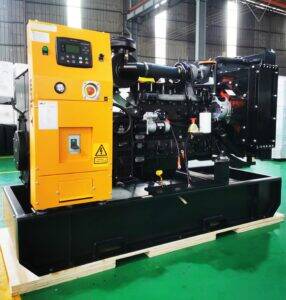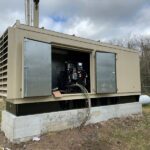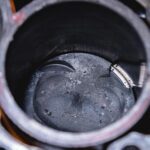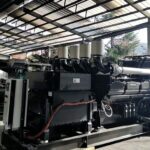Diesel generator fuel consumption can be calculated using the following formula:
Fuel Consumption (L/hr) = Load (kW) × Specific Fuel Consumption (L/kWh)
Specific fuel consumption typically ranges between 0.2 and 0.3 L/kWh under normal operating load.
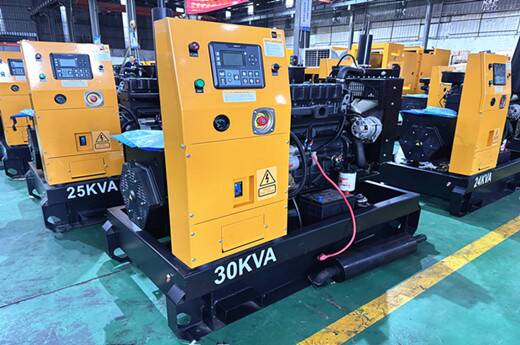
Fuel efficiency is the heart of diesel generator operations. Whether for long runtime jobs or daily standby needs, understanding how much diesel a generator burns helps control cost and optimize supply. Let me walk you through how I break it down when I size up projects with clients.
Below are practical load-based fuel consumption examples.
Fuel Consumption at 50% Load – Example Calculation
Let’s assume a 200 kW diesel generator operating at 50% load.
- Rated power: 200 kW
- Actual load: 100 kW (50%)
- Specific fuel consumption (SFC): 0.25 L/kWh
Fuel Consumption (L/hr) = 100 kW × 0.25 L/kWh
= 25 L/hr
At 50% load, a 200 kW generator typically consumes around 25 liters of diesel per hour.
Fuel Consumption at 75% Load – Example Calculation
Now assume the same 200 kW generator operating at 75% load.
- Actual load: 150 kW
- Specific fuel consumption (improved efficiency): 0.23 L/kWh
Fuel Consumption (L/hr) = 150 kW × 0.23 L/kWh
= 34.5 L/hr
Although the load increased by 50%, fuel consumption did not increase proportionally due to improved engine efficiency at higher load levels.
Real Project Scenario: Construction Site Power Supply
In one of our export projects, a 300 kVA diesel generator was used to power equipment on a construction site.
- Average operating load: 180 kW
- Operating time: 10 hours per day
- Specific fuel consumption: 0.24 L/kWh
Hourly fuel consumption:
Fuel Consumption = 180 kW × 0.24 L/kWh
= 43.2 L/hr
Daily fuel consumption:
43.2 L/hr × 10 hours
= 432 liters per day
Without proper fuel estimation, diesel logistics quickly become a significant operational cost burden.
How to Estimate Required Fuel Tank Capacity
Once hourly fuel consumption is known, fuel tank sizing becomes straightforward.
If a generator consumes 35 L/hr and is required to run for 12 hours:
Required fuel volume:
35 L/hr × 12 hours
= 420 liters
For practical applications, always add a 10–15% safety margin to avoid fuel shortages under fluctuating load conditions.
Proper fuel tank sizing ensures uninterrupted operation and reduces refueling frequency on site.
What Factors Affect Fuel Consumption?
Running costs spike when diesel generators operate inefficiently. Let’s pinpoint what drives that change.
The fuel consumption of a diesel generator depends on load level, engine efficiency, generator sizing, and ambient conditions.
We break these technical factors down in detail in our guide on what truly determines diesel generator fuel consumption.
Several variables influence how much diesel your generator will use per hour. Load percentage plays a major role. A generator running at 25% load burns fuel very differently than one operating at 75% or full load. Efficiency drops when the load is too low or too high, which is why optimal loading is typically around 70–80%.
Engine Design Matters
High-speed engines tend to consume more fuel than medium-speed ones. Turbocharged engines usually offer better efficiency than naturally aspirated types. If I see a machine with poor combustion design or old injector systems, I already expect higher consumption numbers.
Generator Size Must Match Load
Over-sizing or under-sizing hurts efficiency. When a 500 kVA generator supports only a 100 kVA load, the system "wet stacks" a common issue that clogs the engine and increases fuel use.
Ambient Temperature And Altitude
Hot climates or high elevations reduce air density, which lowers engine efficiency. You will notice higher diesel use in desert areas or mountain regions.
| Factor | Impact on Fuel Use |
|---|---|
| Load Percentage | High impact |
| Engine Type | Moderate impact |
| Generator Size | High impact |
| Altitude & Temperature | Moderate impact |
What Is The Formula To Calculate Diesel Generator Fuel Consumption?
Guesswork won't get you far. You need real numbers. This is where formulas help.
Use this formula: Fuel Consumption (L/hr) = Load (kW) × Specific Fuel Consumption (L/kWh).
Every diesel engine has a specific fuel consumption rate, usually between 0.2 and 0.4 L/kWh. Here’s an example from one of our 250 kVA units running at 80% load:
- Load = 200 kW
- Specific Fuel Consumption = 0.25 L/kWh
So, 200 × 0.25 = 50 L/hr
How To Find The Right Specific Fuel Consumption (SFC)
Engine manufacturers publish this number, but it varies with load. You must use the correct SFC based on your load condition. For instance:
| Load % | SFC (L/kWh) |
|---|---|
| 25% | 0.35 |
| 50% | 0.30 |
| 75% | 0.26 |
| 100% | 0.24 |
In real projects, I often verify this with field tests. We run the unit for one hour, record fuel used, and adjust calculations accordingly. For long-term contracts, I even recommend a fuel flow meter for precise data.
How Much Diesel Does A Generator Consume Per kWh?
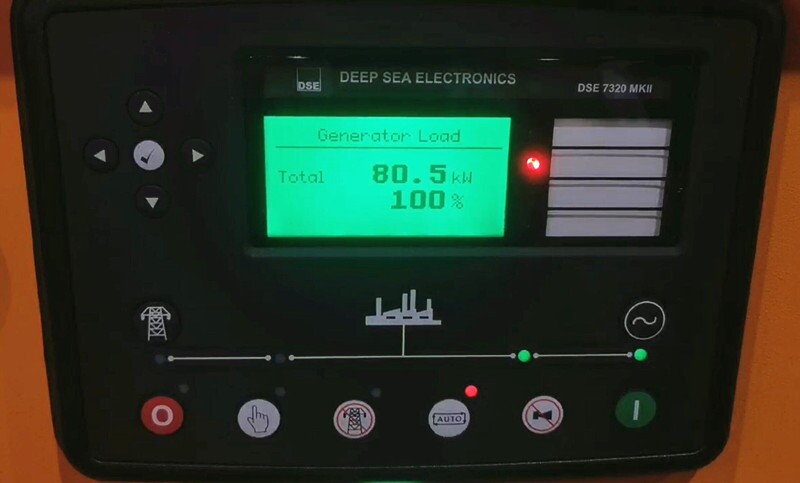
You don’t want just liters per hour. You want cost per unit of energy. That's the only way to compare options.
On average, a diesel generator consumes about 0.25 to 0.3 liters of diesel per kWh.
This is called the heat rate. It varies depending on the generator size and load condition. A small 30 kVA generator may burn more per kWh than a large 500 kVA unit because of lower engine efficiency.
Real-World Examples
When I benchmark different generators, I use this table:
| Generator Size | Load | Fuel Use (L/hr) | Diesel per kWh (L) |
|---|---|---|---|
| 30 kVA | 24 kW | 7 L/hr | 0.29 |
| 100 kVA | 80 kW | 20 L/hr | 0.25 |
| 250 kVA | 200 kW | 50 L/hr | 0.25 |
| 500 kVA | 400 kW | 95 L/hr | 0.237 |
This tells you which model runs more efficiently. That’s a big deal in long-run setups like mining or telecom sites.
How To Reduce Generator Fuel Consumption?
High diesel costs can kill your profit. But there are ways to fix that.
You can reduce generator fuel consumption by matching load properly, maintaining the engine, and using energy-saving technologies.
I’ve helped clients save over 20% on fuel by just optimizing operations. Here are the top methods:
Load Optimization
Keep the generator at 70–80% load. If you often run below 30%, consider switching to a smaller set or paralleling two smaller gensets.
Scheduled Maintenance
Dirty filters, poor injector performance, and old engine oil raise consumption. Stick to your OEM maintenance plan. If possible, measure fuel burn monthly to catch spikes early.
Upgrade Controllers
Modern generator controllers can automate load management and help reduce fuel use. Some even run the generator at variable speeds for better efficiency.
Conclusion
Fuel consumption depends on load, engine, and conditions. Using the right formula and tips can cut costs and improve performance.
Buying And Technical Contact
You can contact us in many ways:
You can go to our website (URL: https://waltpower.com/contact/) and drop us a message.
You can email us:
Our Contact is: +8618717996108 (WhatsApp)

